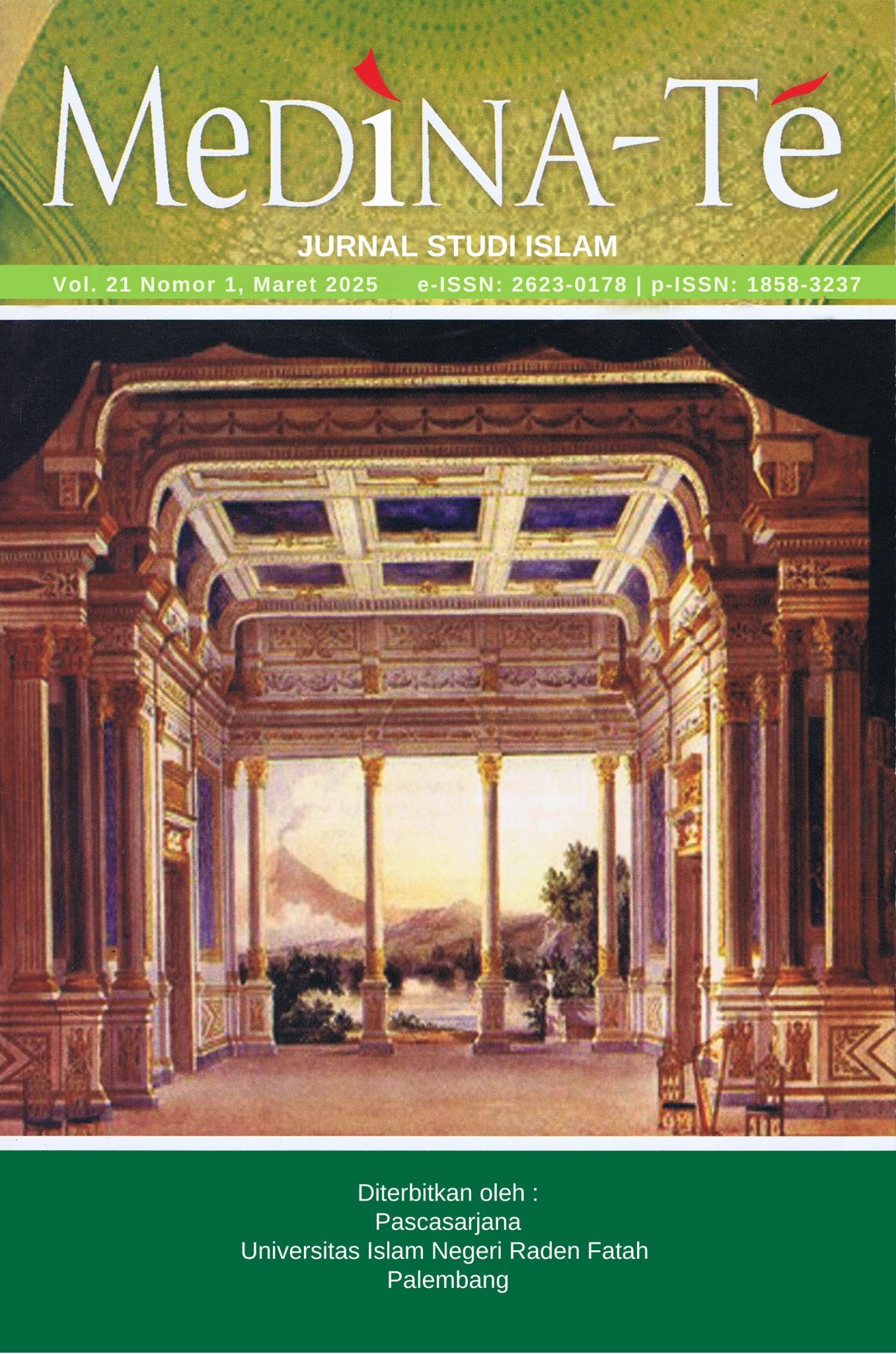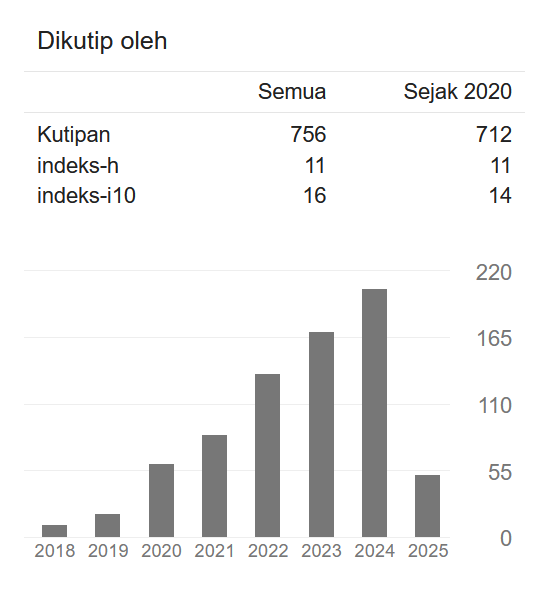Digital Transformation of Islamic Education: AI, Gamification, and Pedagogical Adaptation for Generation Z
DOI:
https://doi.org/10.19109/medinate.v21i1.27952Keywords:
Artificial Intelligence, Digital, Gamification, Islamic EducationAbstract
Islamic education is undergoing a significant transformation due to rapid technological advancements and the learning preferences of Generation Z. Traditional methods such as memorization, halaqah, and talaqqi remain fundamental, yet digitalization is becoming increasingly necessary to maintain engagement and relevance. This study aims to explore the integration of artificial intelligence and gamification into Islamic education, particularly in madrasahs, Islamic boarding schools, and modern Islamic schools in Bogor. Using a mixed methods approach, qualitative data were collected through in-depth interviews and observations, while quantitative data were gathered from surveys involving students, educators, and parents. The findings reveal that while modern Islamic schools have embraced digital learning, madrasahs and Islamic boarding schools face challenges in digital adoption due to resistance from educators, lack of infrastructure, and concerns over maintaining traditional values. Statistical analysis indicates no significant correlation between digital learning preferences and students’ understanding of Islamic values, highlighting the need for a structured approach to digital integration. This study contributes to the field by proposing a hybrid learning model that combines traditional pedagogies with AI-driven personalized learning and interactive gamification techniques. While offering a framework for digital transformation in Islamic education, this study acknowledges limitations, including its focus on a single geographic region and the need for further research on the long-term effects of AI in religious education. Moving forward, strategic policies, educator training, and infrastructure development are essential to ensure that digitalization enhances, rather than compromises, the integrity of Islamic education.
References
Acosta, A. M., Garg, S., Pham, H., Whitaker, M., Anglin, O., O’Halloran, A., Milucky, J., Patel, K., Taylor, C., Wortham, J., Chai, S. J., Kirley, P. D., Alden, N. B., Kawasaki, B., Meek, J., Yousey-Hindes, K., Anderson, E. J., Openo, K. P., Weigel, A., … Havers, F. P. (2021). Racial and Ethnic Disparities in Rates of COVID-19-Associated Hospitalization, Intensive Care Unit Admission, and In-Hospital Death in the United States from March 2020 to February 2021. JAMA Network Open, 4(10), 1–15. https://doi.org/10.1001/jamanetworkopen.2021.30479
Alojail, M., & Khan, S. B. (2023). Impact of Digital Transformation toward Sustainable Development. In Sustainability (Vol. 15, Issue 20). https://doi.org/10.3390/su152014697
Altinyelken, H. K. (2021). Critical thinking and non-formal Islamic education: Perspectives from young Muslims in the Netherlands. Contemporary Islam, 15(3), 267–285. https://doi.org/10.1007/s11562-021-00470-6
Alturise, F. (2020). Evaluation of the blackboard learn learning management system for full online courses in western branch colleges of Qassim university. International Journal of Emerging Technologies in Learning, 15(15), 33–51. https://doi.org/10.3991/ijet.v15i15.14199
Dewi, N. I. K., Gede, I. G. K., Kencanawati, A. A. A. M., & Mataram, I. G. A. B. (2021). Social Media Usage by Generation Z in Pre-trip Planning BT - Proceedings of the International Conference on Applied Science and Technology on Social Science (ICAST-SS 2020). 190–195. https://doi.org/10.2991/assehr.k.210424.036
Ganaie, M. A., Hu, M., Malik, A. K., Tanveer, M., & Suganthan, P. N. (2022). Ensemble deep learning: A review. Engineering Applications of Artificial Intelligence, 115, 105151. https://doi.org/https://doi.org/10.1016/j.engappai.2022.105151
Hampton, D., & Welsh, D. (2019). Work Values of Generation Z Nurses. JONA: The Journal of Nursing Administration, 49(10). https://journals.lww.com/jonajournal/fulltext/2019/10000/work_values_of_generation_z_nurses.7.aspx
Hamdan, C. F., Nursyamsy, D., & Norman, E. Masa Depan Manajemen Hubungan Manusia: Tren, Pengaruh Teknologi, dan Strategi Adaptasi. MES Management Journal, 3(3).
Hutson, J., Fulcher, B., & Ratican, J. (2024). Enhancing Assessment and Feedback in Game Design Programs: Leveraging Generative AI for Efficient and Meaningful Evaluation. IJERI: International Journal of Educational Research and Innovation, 1–20. https://doi.org/10.46661/ijeri.11038
Husnurijal, I. R., Putri, N., & Norman, E. Transformational Leadership as a Strategy to Improve Working Relations in Schools through Islamic Values. MES Management Journal, 3(3).
Intiha’ul Habibah, U. (2021). Implementasi Program Tahfidz Al-Qur’an (Studi Kasus Di SMP Unggulan Al-Furqon Driyorejo Gresik). Jurnal Syntax Admiration, 2(4 SE-), 701–711. https://doi.org/10.46799/jsa.v2i4.222
Mohamed, M. S., Zary, M., Kafie, C., Chilala, C. I., Bahukudumbi, S., Foster, N., Gore, G., Fielding, K., Subbaraman, R., & Schwartzman, K. (2024). The Impact of Digital Adherence Technologies on Health Outcomes in Tuberculosis: A Systematic Review and Meta-Analysis. MedRxiv, 2024.01.31.24302115. https://www.medrxiv.org/content/10.1101/2024.01.31.24302115v1%0Ahttps://www.medrxiv.org/content/10.1101/2024.01.31.24302115v1.abstract
Mulyadi Mulyadi. (2024). Grasping The Management Of Islamic Education Amidst The Digital Era. International Journal of Public Health, 1(2 SE-Articles), 47–53. https://doi.org/10.62951/ijph.v1i2.24
Norman, E., & Pahlawati, E. (2024). Pengembangan kepemimpinan yang adaptif dan fleksibel: Meningkatkan ketahanan organisasi di era transformasi digital. MES Management Journal, 3(1), 298-305.
Norman, E., Pahlawati, E., & Husenudin, A. (2022). Characteristics of Quality Research. Reslaj: Religion Education Social Laa Roiba Journal, 4(1), 152-159.
Norman, E., Aizat, F., Feviasari, H., & Nuryani, M. (2025). Strategic Leadership of School Principals in Enhancing Educational Quality Through Transformational Management and Collaborative Governance. El-Idare: Journal of Islamic Education Management, 11(1), 81-88.
Norman, E., Paramansyah, A., Damayanthy, D., & Marliani, L. (2024). Applying Predictive Analytics for Resource Allocation in Islamic Educational Organizations: Enhancing Efficiency and Decision-Making through AI. Tadrib: Jurnal Pendidikan Agama Islam, 10(2), 1148-1158.
Rahmawati, I., Putri, N., & Norman, E. (2024). Transformational Leadership as a Strategy to Improve Working Relations in Schools through Islamic Values. MES Management Journal, 3(3), 668-676.
Strielkowski, W., Grebennikova, V., Lisovskiy, A., Rakhimova, G., & Vasileva, T. (2024). AI-driven adaptive learning for sustainable educational transformation. Sustainable Development, n/a(n/a). https://doi.org/https://doi.org/10.1002/sd.3221
Sutisna, A., Khoriah, A., & Norman, E. (2024). Transformational Leadership and Team Synergy in Improving Communication and Collaboration in Educational Settings. MES Management Journal, 3(3), 657-667.
Szymkowiak, A., Melović, B., Dabić, M., Jeganathan, K., & Kundi, G. S. (2021). Information technology and Gen Z: The role of teachers, the internet, and technology in the education of young people. Technology in Society, 65, 101565. https://doi.org/https://doi.org/10.1016/j.techsoc.2021.101565
Taufiq Hail, G. A. M., Yusof, S. A. M., Rashid, A., El-Shekeil, I., & Lutfi, A. (2024). Exploring Factors Influencing Gen Z’s Acceptance and Adoption of AI and Cloud-Based Applications and Tools in Academic Attainment. Emerging Science Journal, 8(3), 815–836. https://doi.org/10.28991/ESJ-2024-08-03-02
Tirocchi, S. (2023). Generation Z, values, and media: from influencers to BeReal, between visibility and authenticity. Frontiers in Sociology, 8(January). https://doi.org/10.3389/fsoc.2023.1304093
Wang, D.-Q., Feng, L.-Y., Ye, J.-G., Zou, J.-G., & Zheng, Y.-F. (2023). Accelerating the integration of ChatGPT and other large-scale AI models into biomedical research and healthcare. MedComm – Future Medicine, 2(2), e43. https://doi.org/https://doi.org/10.1002/mef2.43
Zaid, B., Fedtke, J., Shin, D. D., El Kadoussi, A., & Ibahrine, M. (2022). Digital Islam and Muslim Millennials: How Social Media Influencers Reimagine Religious Authority and Islamic Practices. In Religions (Vol. 13, Issue 4). https://doi.org/10.3390/rel13040335








